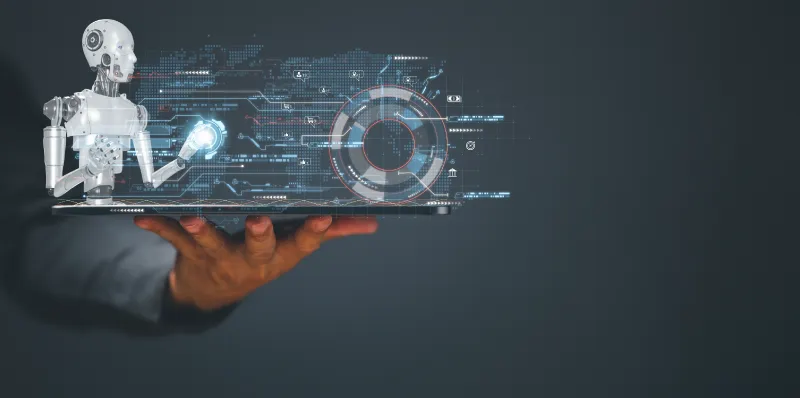Introducción
En este artículo estudiamos cómo las empresas pueden afrontar los retos de un entorno en constante cambio. La adaptabilidad infinita es vital para la supervivencia y el éxito de las empresas. Esto es especialmente cierto en el año 2023, en el pico exponencial de la era de la Inteligencia Artificial.
Proponemos una mentalidad de «adaptación infinita» en lugar de «transformación digital». Esto implica una capacidad organizativa continua para ajustarse a los cambios del mercado, la tecnología, las condiciones económicas, las transformaciones sociales y la crisis medioambiental.
Recopilamos las perspectivas de líderes expertos, lo que nos permite hacer un análisis exhaustivo de cómo las empresas pueden desarrollar una mentalidad de adaptación. Además, presentamos estrategias y prácticas clave que ayudan a las empresas a mantenerse ágiles y flexibles. Acompáñenos en este viaje para descubrir cómo una adaptabilidad empresarial infinita puede marcar la diferencia en el éxito de su empresa.
¿Qué es la Adaptabilidad Infinita?
La adaptabilidad infinita es la capacidad de una organización para responder a los cambios, incluidos los del mercado, la tecnología, el comportamiento humano y la economía. En un mundo cada vez más cambiante y competitivo, la adaptabilidad es fundamental para el éxito de una empresa u otra organización.
Implica ser ágil y flexible, capaz de tomar decisiones oportunas y ajustar la estrategia y los procesos para afrontar los retos y aprovechar las oportunidades.
La adaptabilidad infinita de las organizaciones va más allá de la mera adaptación a los cambios externos. También se refiere a la capacidad de aprender y mejorar continuamente. Una empresa adaptable busca constantemente nuevas formas de mejorar y experimenta con nuevos procesos, productos y servicios.
Como menciona Simon Sinek en su libro«El juego infinito«, los líderes con mentalidad finita creen que la fuerza de una empresa se basa en las ganancias a corto plazo. En cambio, los líderes con mentalidad infinita (y sus organizaciones) dedican su energía a hacer que su empresa perdure en el tiempo, incluso durante varias generaciones.
El camino hacia la adaptabilidad organizativa debe contemplar un profundo proceso de cambio que aborde simultáneamente la transformación digital y cultural.
Sin embargo, lo fundamental es que una empresa no puede ser verdaderamente sostenible y sobrevivir en este «nuevo mundo» si sólo se centra en la tecnología sin tener en cuenta su impacto en sus empleados, clientes, sociedad y medio ambiente, tanto a corto como a largo plazo.
El enfoque sistémico en la empresa debe considerar que todo lo que hacemos (productos, servicios, marketing, inversiones, etc.) tiene un impacto en todo: social, medioambiental y económico, directa o indirectamente. Tania Yovanović Catepillán, Directora Ejecutiva The Best Consulting.
Factores clave para una adaptabilidad infinita:
La adaptabilidad no es un concepto aislado, sino que depende de varios factores clave que pueden impulsar o limitar la capacidad de una organización para adaptarse a los cambios del mercado y a las condiciones económicas. A continuación se enumeran algunos de los factores más importantes que influyen en la adaptabilidad empresarial:
- La cultura: La cultura de una empresa es esencial para su adaptabilidad. Una cultura empresarial que fomente la colaboración, la transparencia y el crecimiento constante puede aumentar la adaptabilidad de la organización. Las empresas con culturas rígidas y jerárquicas pueden tener dificultades para adaptarse al cambio.
- Liderazgo: El liderazgo es clave para impulsar una adaptabilidad infinita. Los líderes deben estar dispuestos a experimentar y aceptar cambios graduales o disruptivos, pensando a corto, medio y largo plazo. También deben crear una visión clara, compartir continuamente la estrategia y reforzar la resistencia de la organización.
- Innovación y creatividad: Las empresas que fomentan la innovación y la creatividad pueden estar mejor preparadas para afrontar los retos y la volatilidad del mercado, así como las oportunidades. Las empresas dispuestas a experimentar y asumir riesgos pueden descubrir nuevas formas de hacer negocios y mantenerse por delante de la competencia.
- Agilidad y flexibilidad: Las empresas deben ser ágiles y flexibles para afrontar los retos y aprovechar las oportunidades. Esto implica ser capaces de tomar decisiones oportunas y ajustar la estrategia, el modelo operativo y los procesos para adaptarse a las cambiantes condiciones del mercado.
- Tecnología y herramientas digitales: La tecnología y las herramientas digitales pueden ser fundamentales para aumentar la adaptabilidad de las empresas. Las empresas que aprovechan los avances tecnológicos pueden mejorar la eficiencia de los procesos, mejorar la toma de decisiones y aumentar el compromiso y la retención de los clientes. Sin embargo, el uso de la tecnología debe equilibrarse con un enfoque centrado en el ser humano que tenga en cuenta las necesidades y preocupaciones de todas las partes interesadas.
- Alianzas estratégicas y tácticas: Permiten a las empresas colaborar con objetivos compartidos. Esto reduce los riesgos al diversificar y proporcionar sinergias y complementariedad, especialmente ante la incertidumbre económica. Esto es clave para la adaptabilidad empresarial. La colaboración en los espacios de trabajo permite la transparencia, crea incentivos para la resiliencia organizativa y aprovecha la innovación, tanto para resolver los retos contingentes como para explorar los futuros.
- Propósito: El propósito no es sólo una declaración de intenciones, sino un compromiso que guía todas las acciones de una empresa. Es importante que la empresa tenga un propósito claro y bien definido. Debe transformar y llegar a muchas personas, además de generar beneficios. Debe estar alineado con criterios medioambientales, sociales y de gobernanza. Un propósito así motiva a los empleados, aumenta la fidelidad de los clientes y genera un impacto positivo en todo el ecosistema.
- Transparencia en la gobernanza: Es fundamental para la adaptabilidad. Se consigue mediante datos, canales, colaboración y tecnología. Esto aumenta la capacidad de tomar decisiones orientadas a los valores y evita posibles crisis de confianza/desconfianza. También crea espacios para la descentralización y la distribución de dichas decisiones.
Estos factores pueden implicar la redefinición de funciones y la creación de nuevos puestos. Formar competencias digitales y competencias humanas (comúnmente conocidas como soft skills).
Es importante que las empresas inviertan, capaciten y proporcionen a sus trabajadores las herramientas necesarias para adaptarse continuamente. Ignacio Sanz, Evolve-Up
Al mismo tiempo, con estos fuertes factores de adaptabilidad, se convierten en un activo para la empresa u organización.
La agilidad como clave de la adaptabilidad
Para las empresas, la agilidad empresarial consiste en ser capaces de adaptarse rápidamente a los cambios en las condiciones del mercado, los avances tecnológicos, las necesidades de unos clientes cada vez más empoderados por la información e incluso afectados por la desinformación. Para ello es necesario adoptar una mentalidad y una cultura que den prioridad a la agilidad y adoptar prácticas que permitan un cambio rápido.
Una cultura de innovación y asunción de riesgos es esencial para fomentar la agilidad organizativa, animando a los trabajadores a proponer nuevas ideas y desafiar el statu quo. Paul Thomas Woodhouse, Rodriguez Pardo & Assocs.
Para lograr una verdadera agilidad empresarial, también es esencial establecer equipos interfuncionales que puedan colaborar y tomar decisiones con rapidez.
Estos equipos deben estar equipados para experimentar y aprender de sus errores, mejorando continuamente sus procesos a lo largo del camino. La agilidad técnica también es crucial, ya que permite a las organizaciones adaptar rápidamente su infraestructura tecnológica a las cambiantes necesidades empresariales.
Marcos como servicio
Los marcos que pretenden promover comportamientos adaptables en la cultura organizativa también se están reconfigurando, pasando de modelos fijos y evolutivos a otros adaptativos, en los que la atención se centra en los procesos de facilitación y compromiso, en lugar de «unificarlo todo.» Se trata de un reto y un debate activos que seguiremos viendo en 2023.
Los marcos lean y ágil, así como la amplia gama de metodologías emergentes, funcionan cada vez más como una biblioteca organizativa que pone en el centro el valor que aporta a las personas.
Algunas startups, que no son expertas en estos marcos ágiles, arrancan su organización para crecer orgánicamente. En otras palabras, utilizan los recursos disponibles para alcanzar sus objetivos y propósitos, incluido su modelo operativo mínimo viable. Rodrigo Bermúdez, cofundador de SKALLING.
Sin duda, para los resultados empresariales, especialmente en las organizaciones medianas y grandes, sigue siendo relevante una burocracia estable, que ahora se enfrenta al reto de ser mínima, viable y más descentralizada.
El fin de la transformación digital
El concepto de «transformación digital» se refiere al uso de tecnologías digitales para transformar y mejorar el modelo de negocio, los procesos y las operaciones de una organización. Sin embargo, hoy en día, el uso de la tecnología es un aspecto fundamental e inherente a cualquier empresa, lo que hace que el término «transformación digital» pueda quedar obsoleto.
La pandemia de COVID-19 y el periodo post-pandémico han demostrado que la Transformación Digital no es una solución única y definitiva para seguir siendo competitivos, sino un vehículo estratégico que debe adaptarse constantemente a los cambios del mercado. Ignacio Sanz, Evolve-Up.
En lugar de centrarse en una única transformación «digital», las empresas deben adoptar una mentalidad de adaptabilidad infinita, que les permita ajustarse continuamente a las cambiantes condiciones externas e internas de la organización.
Esto implica un enfoque más holístico y continuo para incorporar tecnologías y prácticas innovadoras en todos los aspectos de la empresa, en lugar de un enfoque singular y puntual en la «transformación digital.» Por lo tanto, la adaptabilidad infinita se convierte en el nuevo objetivo a largo plazo para las empresas.
El papel de la tecnología genera más confusión cuando hablamos de Transformación Digital. Se cree que es fundamental, pero no es más que una herramienta. Importante, sí, pero sigue siendo solo una herramienta. Tania Yovanović Catepillán, La mejor consultoría.
Hernán Hildebrandt (Cofundador de hahuun 🦋) señala que uno de los mayores desafíos en la transformación digital es el «amor» por la tecnología como solución en sí misma, que puede llevar a confundir el mero consumo con el conocimiento profundo de las herramientas y sus posibles aplicaciones.
Cuando nos centramos únicamente en la adopción de tecnologías emergentes sin una comprensión clara de su propósito y su impacto en nuestra vida cotidiana, corremos el riesgo de caer en trampas y desventajas que podrían limitar su eficacia y crear dependencias poco saludables.
Si abordamos de forma crítica y reflexiva los retos y los conceptos erróneos que presenta la transformación digital, podremos aprovechar al máximo las oportunidades que ofrece la era digital y construir un futuro más justo, inclusivo y sostenible para todos. Hernan Hildebrandt, cofundador de hahuun 🦋.

El papel de la inteligencia artificial en la adaptabilidad de las empresas
La inteligencia artificial (IA) desempeña un papel importante en la adaptabilidad empresarial, ya que puede ayudar a las empresas a ser más eficientes y eficaces en la toma de decisiones. Por ejemplo, la IA puede utilizarse para analizar grandes cantidades de datos y predecir las tendencias del mercado, lo que permite a las empresas tomar decisiones más informadas y ajustar su estrategia a tiempo.
El protagonismo de la Inteligencia Artificial en 2023, con más de mil nuevas herramientas lanzadas en lo que va de año, y el predominio de herramientas generativas como Chat GPT-4, seguirán desafiando a las organizaciones, exponiendo aún más las capacidades de adopción e innovación de los individuos. Rodrigo Bermúdez, Cofundador de SKALLING.
Estas innovadoras herramientas pueden ayudar a las empresas a automatizar y agilizar sus procesos, tomar decisiones basadas en datos e incluso crear experiencias más personalizadas para sus clientes.
Al mantenerse a la vanguardia de las tecnologías emergentes, las organizaciones pueden ser más eficientes y receptivas, y adelantarse a sus competidores. Paul Thomas Woodhouse, Rodriguez Pardo & Assocs.
Además, la IA puede incluir automatización conversacional, análisis, modelización de problemas, optimización y predicciones matemáticas más precisas. Todo ello teniendo en cuenta el volumen de datos históricos, así como los nuevos datos procesados con capacidades informáticas mucho más eficientes en Internet, lo que aumenta el impacto de la IA a escala masiva.

Sin embargo, también es importante tener en cuenta que la IA no puede sustituir por completo al factor humano en la adaptabilidad organizativa. La adaptabilidad también requiere colaboración, creatividad e innovación por parte de los empleados, así como una cultura que fomente la experimentación y el aprendizaje continuo e infinito.»




